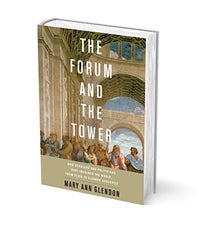In her long career as a law professor, Mary Ann Glendon has seen students struggle to stay idealistic in an imperfect world. Will they lose their moral compass if they choose a life in politics? Risk irrelevance if they stick to academia? Glendon, a former U.S. ambassador to the Vatican, who teaches subjects ranging from comparative constitutional law to political philosophy, has explored how great statespersons and philosophers grappled with similar questions. Their stories inform a new book, which Glendon discussed with the Bulletin this spring, “The Forum and the Tower: How Scholars and Politicians Have Imagined the World, from Plato to Eleanor Roosevelt” (forthcoming from Oxford University Press in July).
HLB: You write that your book came from observing your students. Can you say more about that?
Mary Ann Glendon: Over the years, a considerable number of the students I have known at Boston College, University of Chicago and Harvard law schools have gone on to realize their political ambitions. But what has always haunted me is that many others who came with that idea—including some of the most intelligent, principled and public-spirited—changed their minds by the time they graduated.
One student I had in mind was a former research assistant, Mike Pompeo ’94. When he arrived here after graduating first in his class at West Point and serving with distinction as an Army officer, he was bent on going into politics. When he went into business instead, I felt real regret to see yet another young person of great integrity and ability swerve from his original path. But in fact he didn’t. Mike waited until he and his wife, Susan, had raised their son and assured a sound financial footing for the family. This past November, he was elected to the U.S. Congress from the 4th District of Kansas.
Does your book raise the question, “What does it mean to make a difference?”
 If there is one preoccupation that appears more than any other in the personal essays that students submit with their law school applications, it is “Will I make a difference?” But everyone will make a difference, whether he or she means to or not. So the more sobering question is what kind of difference one will make. And on that point, the yield of the biographies in my book is quite mysterious—for hardly any of the protagonists ever imagined the sorts of influence their work would have in years to come, and many were strikingly mistaken.
If there is one preoccupation that appears more than any other in the personal essays that students submit with their law school applications, it is “Will I make a difference?” But everyone will make a difference, whether he or she means to or not. So the more sobering question is what kind of difference one will make. And on that point, the yield of the biographies in my book is quite mysterious—for hardly any of the protagonists ever imagined the sorts of influence their work would have in years to come, and many were strikingly mistaken.
The poet Rainer Maria Rilke famously admonished a young student to “have patience with everything unresolved in your heart” and not to search for the answers, but to “live your way into the answer.” Is your book delivering a similar message?
Yes and no. I am sure that philosophers and statespersons, as well as poets, benefit from the ability to hold the full complexity of a question in their minds. The political philosophers profiled in my book, however, were too driven by the Eros of the mind to merely “live the questions” without searching for answers. And what sets political actors apart from poets and philosophers alike is that the latter can be as patient as they wish, but [political actors] must decide and act, often on imperfect information, and take responsibility for their decisions and actions.
You have taken care to show when the statespersons and philosophers in your book held personal doubts about their paths in life. Why?
I think it is precisely in the area of doubt about one’s own vocational direction and in the difficult borderland between political and moral compromise where people most desire to see how others have struggled, and to what extent they have failed or succeeded. It is fascinating, for example, to see Cicero wrestle with the difficulty of deciding what to do when, as he put it, “apparent right clashes with apparent advantage,” and second-guessing or berating himself with the benefit of hindsight.
One theme of your book is that the world of the philosopher is not free of politics, and the world of the politician is not free of philosophy.
Perhaps Plato put it best when he chastised both the man of action who never looks beyond immediate concerns and the scholar who keeps his head in the clouds. The man who has “knocked about from youth in the law courts,” says Socrates in the “Theaetetus,” “acquires a tense and bitter shrewdness, but his mind is narrow and crooked. … He passes from youth to manhood with no soundness in him and turns out, in the end, a man of formidable intellect—in his own imagination.” His warning to philosophers was that they should attend to public affairs not only out of civic duty, and not only to stay grounded in reality, but also—and just as importantly—to assure the maintenance of conditions under which intellectual life can flourish.
If you were in charge of assigning this book a category in a bookstore, where would you shelve it? Biography? Intellectual history? Politics?
All three. Best-seller would be nice, too.
For a review of “The Forum and the Tower,” visit The Wall Street Journal online.


